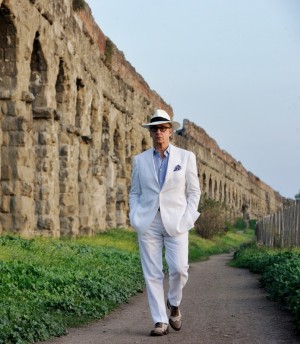When in Rome: A Film Review of ‘The Great Beauty’
Rome. It has an undeniable aura of the eternal, its ancient monuments springing from the city’s foundation like headstones trumpeting the glory of a past golden age. It’s a place of historical richness and mystery, with the remnants of a former empire weaved into a modern metropolis. Paolo Sorrentino’s The Great Beauty (La Grande Bellezza), the newest addition to his directorial canon, puts the Italian capital at the center of its universe and spins us around it like a top.
Sorrentino doesn’t try to awe us into submission, though, with shot after shot of a pristine Rome. Cinematographer Luca Bigazzi, in his fifth collaboration with the director, exhibits stunning photography, to be sure — the film’s guiding principle of “moving light” breathes life into the legendary environs, earning Bigazzi a Golden Globe — but we quickly come face to face with the city’s split personality. Drug and alcohol-fueled late-night parties are the norm in Rome’s high-society circles, and these sexed-up, perverse soirées are a breeding ground of absurdities and oddities.
It’s in this universe that we first meet our protagonist, journalist Jep Gambardella (played by a marvelous Toni Servillo), smiling broadly with cigarette in mouth and dancing away among friends, peers and admirers at his 65th birthday celebration. Jep, catapulted to fame in his youth due to the seemingly universal popularity of his one and only novel, has been a fixture in Roman high society ever since he arrived at the ripe age of 26. “I didn’t just want to live the high life. I wanted to become its king,” he relates to the audience in voiceover narrative, and boy did he get his wish. He’s the epitome of cool, a social staple with an elegant grace, sharp wit and measured, hypnotic mannerism capable of putting anybody, whether it be friend or lover, under his spell. (Owning arguably the most coveted apartment in all of Rome helps, too.) We want to get to know the Italian savant, but there’s something about him that makes the task impossible. His mystery is tantalizing, mesmerizing even. Jep is above all, however, a philosopher, taking note of society’s many ills like some kind of social physician — his is an observant, sometimes cynical voice of reason in an unreasonable and superficial society, at times spewing scathing criticism at his contemporaries (although, even then, the tempered way he delivers such condemnation would have us believe he was discussing something as trivial as that morning’s breakfast).
Sorrentino described The Great Beauty — Italy’s official entry for this year’s Oscar race — at its core, as “a huge mass of interlocked facts, characters and anecdotes, all gravitating around Rome.” Jep, who’s confronted by the memory of a fierce adolescent love from his past, undergoes a personal journey traversing the surreal, the comedic, the grievous, and many times the borderline ridiculous, acting as the adhesive holding the sequential kaleidoscope together and, ultimately, causing him to reexamine his self-worth and extravagant lifestyle.
Servillo is more than up to the challenge dictated by the role, incarnating the world-weary, self-prescribed misanthrope with an uncanny mastery worthy of an Oscar nod (he’s already enjoyed relative success with a Golden Globe nomination). There’s certainly a reason Sorrentino turns to the actor repeatedly as his lead, this being the fourth time the duo has teamed up, the other instances being in One Man Up (2001), The Consequences of Love (2004) and most recently Il Divo (2008). Solid performances across the board from Servillo’s supporting cast, especially from Sabrina Ferilli as middle-aged stripper Ramona and Carlo Verdone as disenchanted friend Romano, make the flick a pleasure to watch.
Combined with a lovely score that highlights Rome’s dichotomy through its mix of contemporary club music and classical pieces, and a smart, highly literary script (Jep likes to quote Flaubert, among other greats) co-written by Sorrentino and Umberto Contarello, it’s not hard to see why The Great Beauty is Oscars-bound. Creative visual cues like a massive cruise ship wreckage laying like a beached whale just off the coast are nice touches that encapsulate one of the film’s overarching motifs: the degeneration of Roman, and the wider Italian, culture, an appropriate and timely message in a country experiencing such present-day economic and political travails. Indeed, death was a consistent theme throughout the 142-minute-long production, reinforcing the message of a country in the midst of a nosedive. The pair of writers may have been a bit too transparent in this regard, however, which slightly dulls the screenplay’s luster. (Jep’s editor seizes on an opportunity to describe reheated rice, saying, “The old is better than the new,” and Romano, even more overtly, confides, “Rome has really disappointed me.”) And while some of the more bizarre scenes — one in particular in which a woman, naked aside from a veil covering her head, runs headlong into the stone column of an aqueduct in some kind of strange public performance ritual — add comic relief and heft to the idea of societal decay, it wouldn’t be unfair to label some as a stretch.
Overall, though, The Great Beauty is a well-executed, nostalgic examination of one of the great international cities and cultures. If nothing else, it’s guaranteed to make you long for a lengthy Italian retreat.
Rating 3.5 out of 4 stars
“The Great Beauty” opens in theaters Friday, November 15th at Lincoln Plaza Cinemas in New York City, followed by a national rollout.
Trailer Courtesy of: TIFF/JanusFilms.
Featured image: Toni Servillo stars as journalist Jep Gambardella in the film “The Great Beauty.” Photo Credit: Gianni Fiorito.

